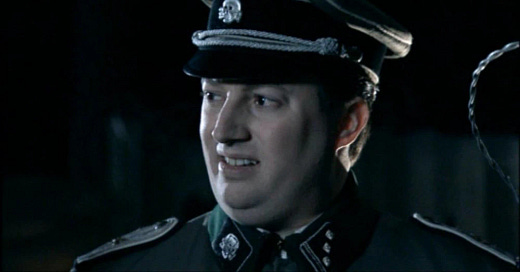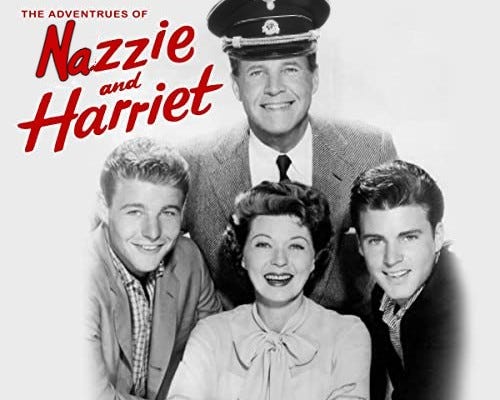Upon sharing my previous post in the wider world, I mostly received positive feedback regarding my assessment of Zone of Interest.
There was some criticism, most of it facile—
"You're looking for a different movie!" Yeah, literally every time you criticize a movie, you're saying you wish the movie was different.
"It's based on a real, historical figure!" I'm guessing you wouldn't accept that argument with regard to certain types of changes in other historical dramas.
"You want to make Nazi Ozzie and Harriet?" I don't even know how to respond to this one, other than to say you missed an obvious "Nazzie and Harriet" joke.
A few points were worth addressing, however. Some readers insisted that working at or living next to a concentration camp would turn you into a cold, insufferable person. That may be (and likely is) true, but Zone does not illustrate that, much less dramatize it. Nothing on screen tells us whether certain personality types were drawn to this type of work, or if this type of work pushed the characters into becoming that kind of person. They simply are.
The most disturbing critics, though, were the ones who claimed they knew people who were like the principal characters. Their intended argument is, again, specious, because I didn't claim the portrayals of the Höss family were unrealistic, just unchallenging.
What disturbed me was the underlying assumption of the argument—they knew other people—but never, ever themselves—who could do great evil. This is a serious problem. I believe everyone is capable of evil, given the wrong incentives and circumstances. But the ones who are most likely to fall into an evil ideology are those who believe themselves immune from such influence. “No, no, it’s someone else who will fall for the demagogue, but not me!”
That was really at the root of most of the criticism—denial that they could ever be on the wrong side.
Which, ultimately, proves I'm right. Zone of Interest did not challenge them at all; it merely reinforced common knowledge (in an admittedly artful manner).
Cinematic Symbolism
The Feral Historian made a great video about the way Nazi iconography has been passed down through the generations—
His closing argument is particularly relevant to this discussion:
All the pop-culture, knock-off Nazis really do protect our political system from actual, old-style fascists… But we can also disconnect it from the regular people who were part of it. People making decisions that were rational within their experiences and objectives. Because it’s not peculiar to that time and place. It could be any of us; that’s the real horror of it.
I've been binging his channel since I discovered it a few months ago. Here's another one about fascism—
Which reminds me, I had promised in the last piece that I'd write about other options for portraying Nazis, besides one-dimensional villains. So let’s get into that after the paywall.
Nondenominational Demons
Hitler has become a kind of secular devil. Nazi imagery has been used for 80 years a generic symbol for “evil,” as pointed out above. But while Hitler certainly had his critics, he wasn’t a universal symbol for evil in the 1930s. He was just one of many bad dictators who existed then and still exist now.
Charlie Chaplin’s classic The Great Dictator came about largely because his Tramp character kinda looked like Hitler.
Later in life, Chaplin regretted the film. He wrote in his autobiography, “Had I known the actual horrors of the German concentration camps, I could not have made The Great Dictator; I could not have made fun of the homicidal insanity of the Nazis.”
Mel Brooks felt differently, mocking the Nazis in his classic film, The Producers.1 He said that “by using the medium of comedy, we can try to rob Hitler of his posthumous power and myths.”
Taika Waititi played another comic version of Hitler in his Oscar-winning film JoJo Rabbit.
Interestingly, Waititi says he didn’t do any research—
I didn’t base him on anything I’d seen about Hitler before. I just made him a version of myself that happened to have a bad haircut and a shitty little mustache. And a mediocre German accent. It would just be too weird to play the actual Hitler, and I don’t think people would enjoy the character as much. Because he was such a fucking cunt, and everyone knows that as well. I think people have got to relate to really enjoy the ride.
Which is basically what I’ve been saying about Zone of Interest!
What all of the above have in common is that they’re parodies, satires, mockeries of Hitler and the Nazis. They’re not realistic in any sense, and they’re not meant to be.
Sympathy for the Secular Devil
No one has ever accused Quentin Tarantino of subtlety, but somehow Inglourious Basterds portrays Nazis with more nuance than any other film I can think of. I’m not talking about Christoph Waltz; Hans Landa is certainly a charming villain, but he’s still a villain from the jump—
No, it’s Fredrick Zoller that interests me here. The first time we meet him, he actually seems nice (if a little pushy). Daniel Brühl plays him with real charm—
Of course, he turns out to be a real bastard who gets what he deserves in the end, but Tarantino still allows us, challenges us to enjoy Zoller’s flirting. The irony is impossible to ignore (the girl is Shosanna Dreyfus, the lone survivor of Landa’s vicious attack in the first scene). Yet the audience, like Shosanna herself, can’t help but be attracted to him. It’s difficult to resolve those contradictions, which is exactly the complex emotion Tarantino is trying to elicit.
Lastly, there’s the group of German soldiers in the bar scene. They’re getting a little tipsy and a bit rowdy, but they seem fun, friendly. Likeable. One of them is even celebrating the birth of his child!
Swap their uniforms for American or British, and they would be absolutely sympathetic characters. But as they are, everyone (the audience and the eponymous basterds) knows the threat these soldiers pose.
That’s the complexity which Zone of Interest lacks. What do you think?
Which was later adapted to the stage as a musical, then re-adapted back to the screen as a movie musical. Very strange.





